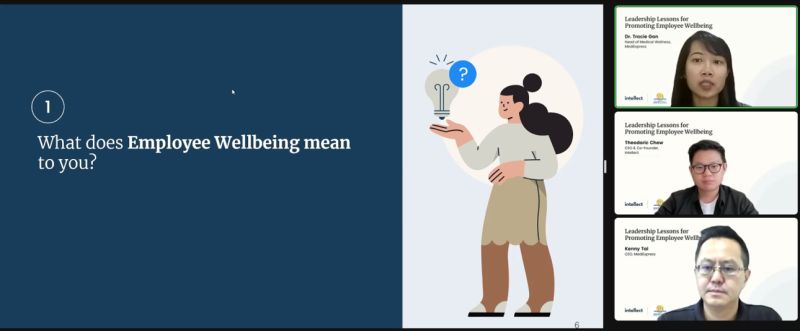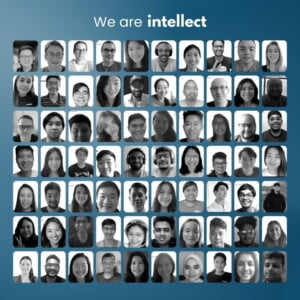The average CEO has to oversee multiple functions, manage various stakeholders, and handle crises as they occur. Typically, they are interviewed about their organisation’s mission, growth, or success. But what about employee wellbeing?
Intellect, in partnership with MediExpress, conducted a one-hour webinar titled “Navigating Uncertainty: Leadership Lessons for Promoting Employee Wellbeing in a Tough Economy.” During the session, Kenny Tai, CEO of MediExpress, and Theodoric Chew from Intellect, both leaders in the care business, shared the necessary mindset shifts to nurture a post-pandemic workforce.

Employee resilience depends on proactive solutions
Because wellness became a hot topic during the pandemic, many organisations responded with one-off initiatives for employee well-being. While these efforts are well-meaning, they are also misguided. Wellness is not something that should be switched on or off, like a marketing campaign. Employees need ongoing support, which traditional EAPs seldom provide.
To move past this counterproductive belief, business leaders may view employee wellbeing as existing on a spectrum.
“Mental health is not a black-and-white issue. It’s not that you either have an illness or you don’t. It actually goes from one being very healthy to moderately stressed to clinically distressed. Our solutions, our policies, and our focus should be on building this preventative approach to care,” said Chew.
From behavioural health coaches to psychiatrists, the mental healthcare your employees need varies with their levels of distress. A modern mental healthcare solution enables organisations to be proactive, so employees are supported before they find themselves on the verge of burnout or resignation.
HR is only a third of the equation

Employees often view well-being as HR’s responsibility, and showing up as their own. If their well-being does not improve, the onus falls on the HR team. But this common view is short-sighted.
Deferring to HR puts strain on the people team, and there is no wonder why 75% of HR professionals experience burnout at least once a month. While HR may spearhead wellness efforts, it is a company-wide responsibility, beginning with the leadership and trickling all the way down to the most junior employee.
“We see it in three levels: How the company’s management views employee wellbeing; how the HR practitioners identify and deploy the right solutions; and how employees on the ground participate in these programs,” said Chew.
From Intellect’s experience, stress triggers can vary from region to region. Relatability is key, and organisations can engage team members across the world in a nuanced manner.
“Critically, management must have an open, constant conversation around employee well-being. Anything from policies that are deployed within the company to how they share vulnerability about their own struggles.”
Weigh upfront costs with long-term losses

Some companies view wellness programs purely as a cost centre, but Chew noted that negligence costs significantly more. Employers with problematic workplace cultures pay a hefty price.
“Without properly protecting our people’s wellbeing, there are a lot of costs a company will incur – everything from employee turnover to presenteeism,” said Chew. “If I don’t take care of this now, what will it cost me in 3 months, 6 months, or 12 months?”
These sentiments were echoed by Tai, who suggested that a wellness program should not be treated any differently from other business initiatives. Its success, therefore, should be tracked with key performance metrics from the very beginning.
According to Tai, some clients use the number of emergency and medical leave days taken as KPIs. A downward trend supposedly shows that employees are in better health and showing up to work with greater focus.
“We must look at what our goals are, and what our measures are. Then we must put in effort to develop programs that will help us achieve those goals based on the measures,” said Tai. He added that pre- and post-implementation surveys can be a source of qualitative data.
The lack of quantitative data is no issue for Intellect’s clients. With Intellect Dimensions, a proprietary measurement framework, HR leaders can finally bring to the boardroom a scientifically-validated ROI measurement of wellbeing programs. Learn more about what the newly-unveiled Intellect 2.0 has to offer.
Strategies may vary even within the organisation

From compliance to revenue, most business domains have best practices that yield absolute answers. It can be tempting to approach employee wellbeing the same way, but what works well in one organisation may backfire in another. Tai’s answer? Deep personalisation.
“This customisation will have to reflect the need of the organisation, which depends on the type of people that we have,” he said, citing a workforce’s seniority, organisational structure, and culture as key considerations.
Taking this a step further, he argued that an employee’s background and market also shape their mental health and attitudes towards wellbeing.
“If we have team members in a certain part of Thailand, what triggers them to be stressed out will be quite different from what would trigger someone to be stressed out in Singapore, for example,” he said.
Given the complexity of developing company-specific and culturally relevant initiatives, Tai advised business leaders to avoid common pitfalls by consulting subject matter experts.
“Not every organisation knows how to manage employee well-being on their own. We cannot be an expert in everything. In that sense, it is important for us to get the right advice, the right partner, and the right organisation to help us through this plan,” he said.
Intellect, for example, connects employees with ICF-certified behavioural health coaches, licensed counsellors, and clinical psychologists in more than 20 countries. The efficacy of our self-care app, which supports employees between sessions, has also been clinically proven.
Start small with everyday interactions

Until an organisation rolls a sprawling program out, the little things can make a world of difference. Tai’s examples include reminding employees to stretch through screen savers, stocking cafeterias with nutritional food, and encouraging five-minute breathing exercises before meetings. These are small touches that help employees maintain their physical and mental wellbeing at work.
However, there are fewer touchpoints to advocate for employee wellbeing in remote work arrangements than in traditional offices. To that end, Tai encouraged organisations to consider the role of kindness in everyday interactions.
“Kindness means taking care of each other’s feelings and how we overcome weaknesses. It could also mean respecting others’ time by being punctual or going into a meeting prepared. All these elements work in one way or another to promote wellbeing.”
How Intellect can help
As Asia’s largest mental healthcare company, Intellect has helped leading employers like Singtel, Shell, and the National University of Singapore (NUS) put these learnings into action. Having listened to our clients, we recently launched Intellect 2.0, starring the aforementioned Intellect Dimensions and Intellect EAP.

In the last six months, we’ve revolutionised the way employers support their workforce with Intellect EAP. Intellect EAP plugs the gaps of existing vendors by tackling the nagging issues of slow and unqualified responses, uncertain follow-up appointments, and inadequate implementation support.
Join the growing number of employers who have made the switch today.








